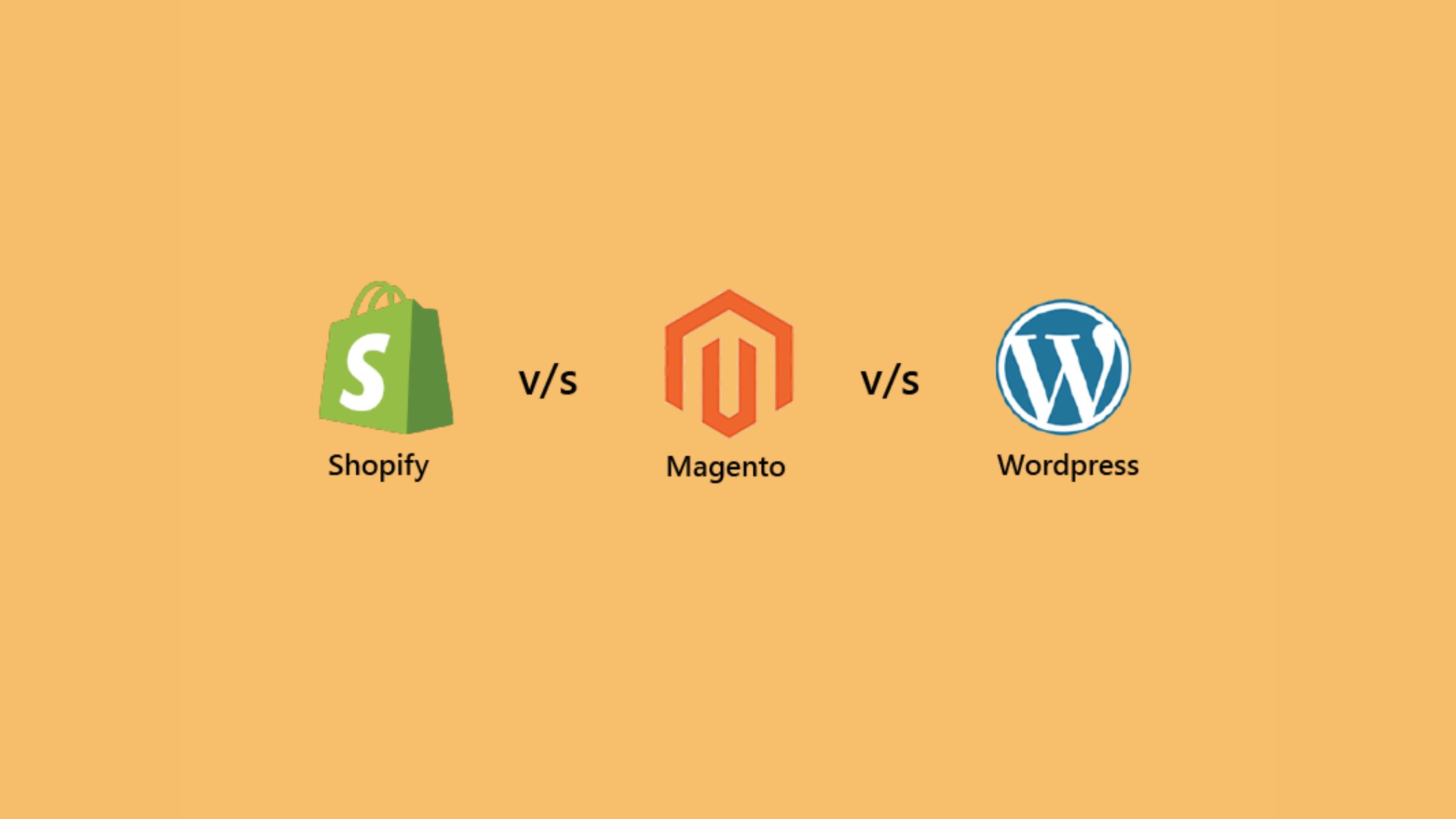Selecting the optimal eCommerce platform for your business is a crucial decision, and with Shopify, WordPress, and Magento dominating approximately 71% of the market share, the choice can be challenging. Currently boasting over 500,000 customers, Shopify, along with WordPress and its millions of active websites, and Magento with a solid base of over 250,000 websites, are all backed by powerful multibillion-dollar corporations, ensuring continuous software updates and improvements.
To assist you in making an informed decision, we will delve into a comprehensive comparison of Shopify, Magento, and WordPress in this blog post. By exploring the strengths and weaknesses of each platform, as well as identifying the types of businesses that each platform is best suited for, we aim to guide you towards selecting the most suitable eCommerce solution for your specific needs.
Let's embark on this exploration to help you make the right choice for your business.
What is Shopify?
Shopify, a user-friendly online commerce tool, offers a Point of Sale (POS) system for both online and physical retail transactions. This platform empowers businesses to establish a cohesive multi-channel presence, showcasing their brand identity. Utilizing a subscription-based model, Shopify enables users to effortlessly create websites, implement a streamlined shopping cart solution, and efficiently manage product sales and shipments.
Equipped with a suite of analytical tools, Shopify allows users to gain insights into various aspects of their online store. The platform facilitates the creation of personalized online experiences, enhancing Return on Investment (ROI) through effective marketing spending. Additionally, Shopify supports cost savings by automating processes such as customer relationship management, inventory management, transactions, and more.
Now that you have a comprehensive understanding of Shopify, let's explore some popular web applications powered by this dynamic platform!
Top 5 Shopify stores across the globe
ColourPop Cosmetics
Fashion Nova
Jeffree Star Cosmetics
Omaze
Decathlon
What is WordPress?
Conceived by Matt Mullenweg and Mike Little in 2003, WordPress stands as a content management system (CMS). Originally designed as a tool to simplify website and blog creation for users without coding skills, it has evolved into a free, open-source software system released under the GNU General Public License version 2 (or later). This licensing approach allows anyone to use, modify, or contribute to the codebase freely.
WordPress, as an open-source platform, features end-to-end encryption, offering users the option to implement it on their web server or through a hosting company. Its adaptability and user-friendly interface have fostered a large community of users and developers. This community has actively contributed themes, plugins, and various tools, enabling the construction of diverse digital entities, ranging from expansive web stores to compact blogs.
With this understanding of WordPress, let's explore some remarkable web applications powered by the world's most widely used CMS!
Top WordPress Stores:
Sony Music
PlayStation Blog
TechCrunch
The Next Web
Time Magazine
What is Magento?
Magento stands out as an exceptional eCommerce platform, conceived by its co-founder Roy Rubin in 2008 and developed with open-source software. This unique approach empowers users to personalize the appearance, functionality, and content of their online businesses while maintaining a seamless purchasing experience. Alongside this flexibility, Magento equips users with essential tools and features, encompassing marketing, SEO, and catalog management software.
Notably adaptable to businesses of any size, the Magento platform caters to diverse needs. It presents users with both the free Magento Open Source and the feature-rich Magento Commerce platform, allowing seamless growth and adaptation regardless of whether the business serves a modest client base or a substantial customer audience numbering in the millions. This adaptability is particularly advantageous for businesses undergoing expansion and contemplating a platform switch.
Armed with a comprehensive understanding of Magento, let's explore some impressive web applications powered by this influential eCommerce platform, highlighting its dominance in online commerce!
Top Magento Stores:
Asus
Land Rover
Ford
COURT Asia
Kipling
Features: Shopify vs WordPress vs Magento
1. Easy of use:
Selecting a user-friendly platform is crucial for creating the desired eCommerce store, as the ease of use directly influences your ability to shape an impactful online presence and can impact your brand image.
In this context, Shopify stands out as a notably more accessible option compared to WordPress and Magento. Shopify offers a streamlined, one-stop-shop experience with its drag-and-drop website-building platform, enabling users to effortlessly customize their stores by moving elements around the page precisely to their preferences.
On the other hand, WordPress, when compared to Shopify, presents slightly more complexity. While it provides built-in features, creating comprehensive websites may require the use of custom code or plugins. Moreover, WordPress is not inherently configured for online selling, necessitating the installation of a plugin to make it eCommerce-ready.
In contrast, Magento has a steeper learning curve compared to both Shopify and WordPress. To achieve the desired online store, users either need a solid understanding of coding and language or may choose to engage a web developer for assistance.
In summary, the user-friendly nature of Shopify sets it apart, offering a straightforward experience for customizing eCommerce stores. This simplicity makes Shopify an appealing choice for businesses aiming to avoid challenges and enhance their online presence seamlessly.
2. Themes:
The appearance of your online store, as determined by its theme, plays a crucial role in shaping the impression visitors have, with 48% stating that a website's design is the most critical factor in assessing a business's credibility. Therefore, choosing your template wisely is essential for making a positive first impression and building trust.
Shopify provides a diverse array of themes, featuring 13 free options and 73 paid themes. While these options offer a range of design choices, some customers may find them a bit pricey, with prices ranging between $150 and $350 for a theme on the Shopify platform.
In contrast, WordPress boasts an extensive collection of themes, offering a wealth of customization options. Users enjoy full control over the source code and can utilize plugins and drag-and-drop tools to craft their unique themes. Additionally, WordPress users have the option to enlist the expertise of developers to create a tailor-made website.
Magento, on the other hand, offers six fully mobile-responsive themes available for $499. For those who prefer a more customized approach, Magento allows users to start from scratch, though this requires in-depth coding knowledge or a budget sufficient to hire professional assistance.
In conclusion, the choice of themes is a significant consideration for your online store, and each platform—Shopify, WordPress, and Magento—offers distinct options and customization capabilities to meet diverse preferences and requirements.
3. Pricing:
Shopify Cost
Shopify Lite $9 per month
Basic Shopify $29 per month
Shopify $79 per month
Advanced Shopify $299 per month
Shopify Plus is negotiable but usually costs around $2,000 per month
WordPress Cost
Factors $12
Domain name $2.95 – $49.95
Hosting $0 – $200
Pre-made themes $0 – $1,000
Plugins $50 – $550
Security $0 – $1,000
Developer fees One-off, monthly, or annually
Magento
The three Magento packages are listed below, along with the total price you can expect to pay for your website:
Magento Open Source ($15,000+)
Magento Commerce ($22,000+)
Magento Commerce Cloud ( $40,000+)
4. Apps, Extensions, and Plugins:
Shopify Apps:
The Shopify App Store has over 4200 free and paid apps to help you expand your store’s functionality, control it, and increase sales.
Additionally, Shopify gives you the option of integrating marketing email campaigns like MailChimp to reach out to your target audience.
WordPress Plugins:
You have access to over 50,000 plugins by default. You can add and customize any WordPress plugins/apps to your self-hosted WordPress.org site. Otherwise, you can only install plugins on WordPress.com if you’re on the Business or e-commerce plans, which cost $25 and $45 per month, respectively.
Magento Extensions:
Magento provides nearly 3600+ extensions through the Magento marketplace. Furthermore, installing and implementing these extensions does not require extensive coding experience.
Various highlight add-ons are really useful.
5. SEO:
The Shopify platform offers robust SEO functionality, making it easy for users to create Google-friendly content without requiring prior expertise. Shopify allows users to edit meta titles, add descriptions, change page URLs, implement 301 redirects, and more. Additionally, Shopify provides helpful suggestions for best SEO practices when adding products. The platform also boasts a wide range of apps and add-ons designed to optimize stores and enhance their rankings on search engines, including Google.
Magento, too, provides numerous SEO solutions, including features such as Google sitemaps, SEO-friendly URLs, sorting popular searches, compatibility with various search engines, and customer sorting attributes. Additionally, Magento enhances loading speed by minimizing the use of .css and .js files.
WordPress, with its primary focus on blogging, places significant emphasis on SEO. Users of WordPress.com, across both free and paid plans, benefit from Jetpack Essentials features. Jetpack Essentials includes tools for optimizing sites, safeguarding against spam comments, and incorporating essential ranking factors such as SEO, social sharing, and performance technologies. However, unless users have a Business plan and the ability to install additional SEO plugins like Yoast SEO, they may have limited control over their SEO settings.
In summary, each platform—Shopify, Magento, and WordPress—provides distinct SEO features and tools, catering to various user needs and preferences.
Shopify vs WordPress vs Magento: Pros and Cons
Shopify Pros:
There are numerous attractive, responsive store themes to pick from
An all-in-one eCommerce builder
Great app store for enhancing the functionality of your website
Easy to use
Many checkout and payment options.
A large number of loyal supporters
Shopify Cons
Most themes have expenses involved with them
It becomes more challenging to integrate apps into your store
Every transaction is subject to a fee (unless you use Shopify payments)
WordPress Pros:
Free and easy to use
Customization
Easier management of products and inventory
Support for multiple currencies and payment gateways
Web analytics
SEO-friendly
WordPress Cons:
Restricted support for e-commerce issues
The theme should be compatible with the WooCommerce plugin
Security issues
Limited functionalities for big e-commerce stores
Inconsistent themes and plugins
Magento Pros:
Fantastic community with lots of support for users
Flexible platform with tons of customization options
Good range of themes to pick from
Phone support available
No real coding knowledge is required for Magento commerce
Magento is open-source and free to use
Magento 2 extensions
Magento Cons:
It has a steep learning curve
Quite difficult for beginners
It needs a lot of time to set up
Lots of costs are attached to establishing your store
Which is better: Shopify vs WordPress vs Magento
Magento is well-suited for companies with in-house developers, while WordPress is an excellent choice for bloggers. Shopify, on the other hand, is particularly advantageous for small to medium-sized businesses and is user-friendly for those without programming expertise. Shopify's eCommerce platform includes features like discounts, gift cards, support for infinite products, fraud analysis, staff accounts, and more.
Similar to WordPress, Shopify allows users to create a blog. All Shopify subscriptions come with hosting, unlimited bandwidth, and online storage. In contrast, Magento requires users to manage their own server and cloud storage. If utilizing third-party services with Magento, hosting and storage expenses may increase as the business expands.
Ultimately, the choice between Magento, WordPress, and Shopify depends on your project requirements. Each platform has its strengths and caters to specific needs. Before deciding on your online store development, it's advisable to follow a checklist to ensure you choose the right platform for your business.
Is the pricing of this solution competitive?
Is it easy to use?
What payment gateways can I use with it?
How many product variants and options can I use?
What are the SEO features like?
Is it good for dropshipping?
Does it facilitate point-of-sale transactions?
Does it facilitate selling in multiple currencies?
Does it facilitate AMP on product pages?
Is there a mobile app available for it?
Conclusion:
As highlighted in the introduction, choosing the right e-commerce platform is a critical decision when establishing an online store. The answer to this common query, however, is often nuanced and depends on various factors such as technical proficiency, budget, store size, and required functionality.
Shopify is recommended for small businesses aiming to build their online presence. Its user-friendly interface and comprehensive features make it suitable for those with varying technical abilities.
Magento is well-suited for large businesses with substantial resources. Its robust capabilities and scalability cater to the needs of enterprises with more extensive requirements.
WordPress is beneficial for small and medium-sized enterprises. Offering flexibility and customization options, it is an ideal choice for businesses looking for a balance between features and simplicity.
We trust that this post has provided ample information to guide you in determining the best e-commerce platform for your needs. Additionally, if you decide to use any of the mentioned platforms, our team of experts is available to set up your e-commerce profile and customize themes for your online store. For more information, please contact us now!




Comments (0)